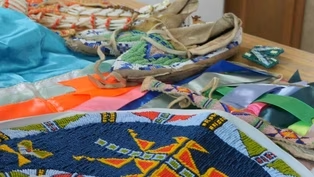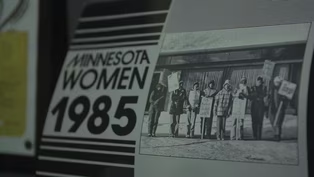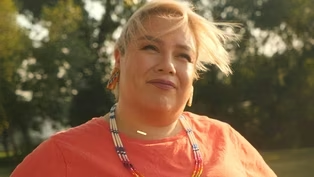
Karina Kafka
Clip: Season 15 Episode 6 | 10m 2sVideo has Closed Captions
Karina Kafka created a film called “A Mother’s Love" about missing indigenous women.
Karina Kafka of Ortonville, Minnesota, made her first documentary called “A Mother’s Love,” which she worked on while studying at Augsburg University in Minneapolis, about missing and murdered indigenous women.
Problems playing video? | Closed Captioning Feedback
Problems playing video? | Closed Captioning Feedback
Postcards is a local public television program presented by Pioneer PBS
Production sponsorship is provided by contributions from the voters of Minnesota through a legislative appropriation from the Arts and Cultural Heritage Fund, Explore Alexandria Tourism, Shalom Hill Farm, West Central...

Karina Kafka
Clip: Season 15 Episode 6 | 10m 2sVideo has Closed Captions
Karina Kafka of Ortonville, Minnesota, made her first documentary called “A Mother’s Love,” which she worked on while studying at Augsburg University in Minneapolis, about missing and murdered indigenous women.
Problems playing video? | Closed Captioning Feedback
How to Watch Postcards
Postcards is available to stream on pbs.org and the free PBS App, available on iPhone, Apple TV, Android TV, Android smartphones, Amazon Fire TV, Amazon Fire Tablet, Roku, Samsung Smart TV, and Vizio.
Providing Support for PBS.org
Learn Moreabout PBS online sponsorship- I grew up in Ortonville, Minnesota.
And it's a fairly small town, 1,800 people.
And childhood was pretty good.
I grew up in a predominantly White town.
So it was a little difficult for me growing up.
But as I got older and decided I wanna move to a bigger city with more people of color, it helped a lot once I moved.
And I still love the town.
It has its good qualities.
(gentle music) But I think maybe in middle school is when I decided I wanted to become a filmmaker.
(gentle music) My documentary is called "A Mother's Love."
And it's about missing and murdered Indigenous women.
And it's a topic that I had been thinking about doing for probably two or three years before I started filming.
And it started off when Gabby Petito went missing.
And she got so much coverage.
Which, I mean, people should get coverage if they go missing like that.
But it made me realize that if I were to go missing, a woman of color, or one of my friends, or anyone, would they get the same coverage that she got?
And the answer is "No."
And that made me do more research on women of color going missing.
And then it led me to Indigenous women going missing.
And I never realized that they don't even have a number of how many have gone missing.
It's a really serious situation, and it's not getting talked about.
So yeah, that led me to wanting to cover this topic.
And it's a topic that I wanna keep covering.
- When a Native female is missing, or even a Native man, like, "Oh, they're just the big partiers," and you'll find them in the drunk tank, or they'll be in jail, or we'll find them eventually.
No.
It's like this girl disappeared.
Now if it was a White girl, how would you be thinking about this?
Would that have made a big difference?
- I directed, produced, edited it, shot it.
So I got my hand in all aspects of the documentary.
But I really enjoyed getting to know the subject and building that connection.
And you have to build trust with them and just learning more about her life, her perspectives.
(gentle music) The main thing I want people to take away from "A Mother's Love," is to just be aware about what's going on to Indigenous families, women, and try to be educated more on the topic and don't be afraid to bring it up.
(gentle music) - By late afternoon, I was still texting her, messaging her, and I couldn't get ahold of her.
And I was like, "Something's wrong then."
'Cause by now she would've texted me or messaged me back.
Calling, calling, nothing.
Messaging, nothing.
So I waited.
'Cause I was like, "She'll be back."
'Cause that's her responsibility.
She knows she has to come back.
That's when I really got worried.
And then I went to dialysis and then I called the police after that.
'Cause she didn't show up to dialysis either.
My first mistake was waiting too long that first day.
I should have called that evening.
And I thought, "No, she'll come back.
She's grown.
She knows she has to come back.
I need help."
I gotta go dialysis, I gotta do this.
And she's the one that takes me and gets me ready.
The first thing the detective said to me was, "Oh, are you sure she didn't go back to the reservation?
Maybe she's just partying or something."
No, she's not.
She abandoned us.
She's my caretaker.
And if she was gonna do something like that, that's stupid, she would've got ahold of me and told me, "Hey, I'm gonna head out over here."
So she didn't do that either.
She's just gone.
So I really thought, "Why would you think that?"
Is it because, and I asked him that, "Why?"
He said, "Well, I'm just.." I said, "So you think every Native comes from the reservation?
Some of them don't live on a, have never grown up, like my kids."
So it was dumb.
But I already knew in my heart that my daughter wasn't gonna get a lot of coverage.
You already know that whenever your kid is missing and she's Native, that you're not gonna get a lot of cooperation from the authorities.
They're not gonna do anything that they would do for a White girl.
They're not gonna do that.
They're not.
Everybody else will get more coverage than a Native.
They're thought of less than anything, even less than cattle.
Or not even considered valuable as cattle are.
All these Indigenous people are missing, and a lot of it's Native women that are missing.
'Cause we're not thought of.
When I was growing up and a girl would disappear, or she would go to the city and you never heard from her again, just her family would be worried.
Sometimes they go looking for her or that was it.
But the tribe would never help you.
Police weren't really helpful.
Nobody would really do anything.
Nobody really cared.
I had a older cousin, well, older auntie.
She's cousin to my mom.
Her name was Debbie.
And she was about 18 years old, and we all grew up together.
I was really young whenever she left and she was supposed to go on a trip and come back.
And she never came back.
And nobody heard from her for like two or three years.
My grandma would try to look for her.
Call different places and do this and that.
Couldn't find her.
Once in a while my grandma would also wanna go, try to look for her, and my grandpa, and then find her.
So one day my grandmother and them got a phone call and it was from a hospital here in Sioux Falls.
And she was in critical condition and gonna die.
And they needed somebody to come and pull the plug basically.
And my grandma was shocked.
She's like, "Where has she been?"
We haven't heard from her for almost three years.
And she was back.
And the only way grandma got a call was that they found a number in Debbie's belongings.
The police found it, found her on the streets here, somewhere in Sioux Falls.
What they thought was passed out.
And she wasn't.
She had been assaulted or something.
She had a brain injury or something, brain trauma.
And they got her to the hospital, but she died.
Probably the next day after grandpa and grandma got there.
So grandma always told me that, to be careful when you're a Native girl, because things can happen to you.
She always worried about us when we lived in the city, especially me, 'cause I've always been everywhere.
She didn't know what to make of that.
She always told me to watch myself, 'cause she said bad things will happen to you, or could happen to you.
(gentle music) (gentle music continues) (gentle music continues) (upbeat music) (upbeat music continues) - [Narrator] "Postcards" is made possible by the Minnesota Arts and Cultural Heritage Fund and the citizens of Minnesota.
Additional support provided by, Margaret A. Cargill Philanthropies.
Mark and Margaret Yackel-Juleen, on behalf of Shalom Hill Farms, a retreat and conference center in a prairie setting near Windom, Minnesota.
On the web at shalomhillfarm.org.
Alexandria, Minnesota, a year-round destination with hundreds of lakes, trails, and attractions for memorable vacations and events.
More information at explorealex.com.
The Lake Region Arts Council's Arts Calendar, an arts and cultural heritage funded digital calendar showcasing upcoming art events and opportunities for artists in West Central Minnesota.
On the web at lrac4calendar.org.
Playing today's new music, plus your favorite hits, 96.7 KRAM, online at 967kram.com.
(bright music)
Beadwork, Filmmaker, Willmar 8
Preview: S15 Ep6 | 40s | Raine Cloud's beadwork; Karina Kafka's feature film, and the ”Willmar 8” legacy. (40s)
Eight Women Together Alone Teaser
Video has Closed Captions
Clip: S15 Ep6 | 6m 11s | The influential women of the Willmar 8 who participated in America's first bank strike. (6m 11s)
Video has Closed Captions
Clip: S15 Ep6 | 13m 32s | Raine Cloud has spent most of her life studying and creating beadwork. (13m 32s)
Providing Support for PBS.org
Learn Moreabout PBS online sponsorship

- Arts and Music
The Best of the Joy of Painting with Bob Ross
A pop icon, Bob Ross offers soothing words of wisdom as he paints captivating landscapes.












Support for PBS provided by:









